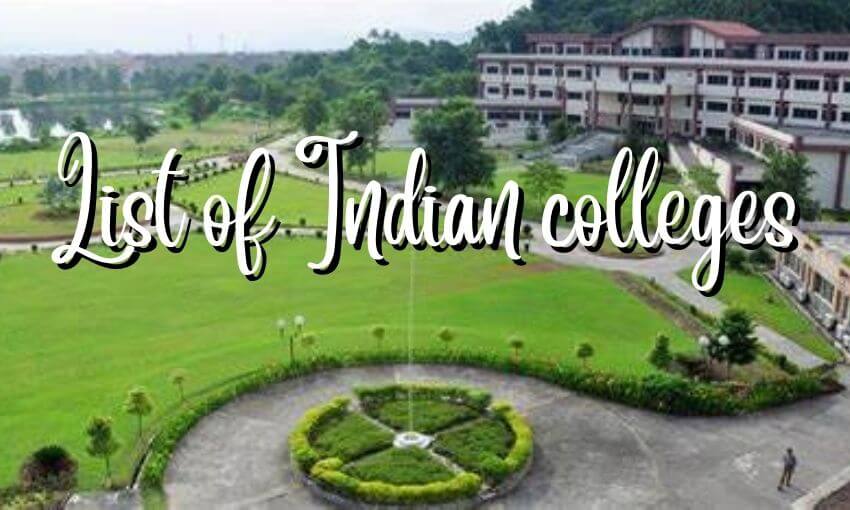The List of Indian Colleges is a comprehensive list of higher education institutions in India. It includes universities, colleges, and other educational institutions that offer a variety of courses in the fields of engineering, medicine, law, business, and other disciplines. The list is compiled by the University Grants Commission (UGC) and is updated regularly. It is an invaluable resource for students looking to pursue higher education in India. It provides information on the various courses offered, the fees structure, and the admission process. It also provides contact information for the various institutions. This list is an important tool for students to make informed decisions about their educational future.

The Pros and Cons of Attending an Indian College
Pros
1. Cost
Attending an Indian college is often much more affordable than attending a college in the United States or other Western countries. This can be a great option for students who are looking to save money on their education.
2. Cultural Experience
Attending an Indian college can be a great way to immerse yourself in the culture and learn more about the country. You will be able to experience the food, the language, and the customs of the country firsthand.
3. Quality Education
Indian colleges offer a high-quality education that is on par with many Western universities. The curriculum is often rigorous and the professors are highly qualified.
Cons
1. Language Barrier
If you are not fluent in the language of the country, it can be difficult to understand the lectures and assignments. This can make it difficult to keep up with the coursework and can be a major obstacle to success.
2. Limited Resources
Indian colleges often have limited resources compared to Western universities. This can make it difficult to access the materials and technology needed to complete assignments and research projects.
3. Cultural Differences
The cultural differences between India and the West can be a challenge for some students. It can be difficult to adjust to the different customs and expectations of the country.
How to Choose the Right Indian College for You
Choosing the right college is an important decision that can have a lasting impact on your future. If you’re considering an Indian college, there are a few key factors to consider.
First, think about the type of college you’re looking for. Do you want a large university with a wide range of courses and activities, or a smaller college with a more intimate atmosphere? Do you want to study in a city or a rural area? Do you want to attend a public or private college?
Next, consider the academic programs offered. What type of degree are you interested in pursuing? Are there any specializations or concentrations that you’d like to focus on? Are there any research opportunities available?
Finally, think about the cost of attending the college. Are there any scholarships or grants available? Are there any payment plans or other financial aid options?
By taking the time to consider these factors, you can make sure you choose the right Indian college for you. Good luck!
The Benefits of Attending an Indian College
Attending an Indian college can be a great experience for students, as it offers a unique opportunity to learn about the culture and history of the country. From the vibrant colors of traditional clothing to the delicious cuisine, there is much to explore and appreciate. Additionally, attending an Indian college can provide students with a number of benefits that can help them succeed in their academic and professional pursuits.
First, attending an Indian college can provide students with a unique educational experience. Indian colleges often offer courses that are not available at other universities, such as courses in Indian philosophy, religion, and culture. These courses can provide students with a deeper understanding of the country’s history and culture, which can be beneficial for those who are interested in pursuing a career in international relations or other related fields. Additionally, many Indian colleges offer courses in the Hindi language, which can be beneficial for those who are looking to learn a new language or gain a better understanding of the culture.
Second, attending an Indian college can provide students with access to a diverse student body. Indian colleges often have a large number of international students, which can provide students with the opportunity to learn about different cultures and make friends from around the world. Additionally, many Indian colleges have a strong emphasis on community service, which can be beneficial for those who are looking to gain experience in the field.
Finally, attending an Indian college can provide students with access to a wide range of resources. Indian colleges often have well-equipped libraries, computer labs, and other resources that can be beneficial for students who are looking to further their education. Additionally, many Indian colleges offer a variety of extracurricular activities, such as sports teams, clubs, and other organizations, which can provide students with the opportunity to explore their interests and develop new skills.
Overall, attending an Indian college can be a great experience for students, as it offers a unique opportunity to learn about the culture and history of the country. Additionally, attending an Indian college can provide students with access to a diverse student body, a wide range of resources, and a variety of extracurricular activities. For these reasons, attending an Indian college can be a great way for students to further their education and gain valuable experience.
Exploring the Different Types of Indian Colleges
India is home to a wide variety of colleges, each offering a unique educational experience. From prestigious universities to small community colleges, there is something for everyone. In this article, we will explore the different types of Indian colleges and what they have to offer.
First, let’s look at the traditional universities. These are the most well-known and respected institutions in India. They offer a wide range of courses and degrees, from undergraduate to postgraduate. These universities are often highly competitive and require a high level of academic achievement. They are also usually well-funded and have a strong research focus.
Next, we have the smaller community colleges. These are typically smaller institutions that offer a more intimate learning environment. They are often less competitive than traditional universities and may offer more specialized courses. They are also usually more affordable than traditional universities.
Finally, there are the private colleges. These are typically for-profit institutions that offer a variety of courses and degrees. They are often more expensive than traditional universities, but they may offer more flexible schedules and more specialized courses.
No matter which type of college you choose, you can be sure that you will receive a quality education. Each type of college has its own unique advantages and disadvantages, so it is important to do your research and find the one that best suits your needs.
Ranking the Top 10 Indian Colleges for Engineering
1. Indian Institute of Technology (IIT) Bombay
IIT Bombay is the top engineering college in India and is renowned for its excellent faculty, world-class infrastructure, and cutting-edge research. It offers a wide range of courses in engineering, science, and technology.
2. Indian Institute of Technology (IIT) Delhi
IIT Delhi is the second-best engineering college in India and is known for its excellent faculty, world-class infrastructure, and cutting-edge research. It offers a wide range of courses in engineering, science, and technology.
3. Indian Institute of Technology (IIT) Madras
IIT Madras is the third-best engineering college in India and is renowned for its excellent faculty, world-class infrastructure, and cutting-edge research. It offers a wide range of courses in engineering, science, and technology.
4. Indian Institute of Technology (IIT) Kanpur
IIT Kanpur is the fourth-best engineering college in India and is known for its excellent faculty, world-class infrastructure, and cutting-edge research. It offers a wide range of courses in engineering, science, and technology.
5. Indian Institute of Technology (IIT) Kharagpur
IIT Kharagpur is the fifth-best engineering college in India and is renowned for its excellent faculty, world-class infrastructure, and cutting-edge research. It offers a wide range of courses in engineering, science, and technology.
6. Birla Institute of Technology and Science (BITS) Pilani
BITS Pilani is the sixth-best engineering college in India and is known for its excellent faculty, world-class infrastructure, and cutting-edge research. It offers a wide range of courses in engineering, science, and technology.
7. Indian Institute of Technology (IIT) Roorkee
IIT Roorkee is the seventh-best engineering college in India and is renowned for its excellent faculty, world-class infrastructure, and cutting-edge research. It offers a wide range of courses in engineering, science, and technology.
8. Vellore Institute of Technology (VIT)
VIT is the eighth-best engineering college in India and is known for its excellent faculty, world-class infrastructure, and cutting-edge research. It offers a wide range of courses in engineering, science, and technology.
9. National Institute of Technology (NIT) Tiruchirappalli
NIT Tiruchirappalli is the ninth-best engineering college in India and is renowned for its excellent faculty, world-class infrastructure, and cutting-edge research. It offers a wide range of courses in engineering, science, and technology.
10. Indian Institute of Technology (IIT) Guwahati
IIT Guwahati is the tenth-best engineering college in India and is known for its excellent faculty, world-class infrastructure, and cutting-edge research. It offers a wide range of courses in engineering, science, and technology.
Conclusion
The List of Indian Colleges is a comprehensive and invaluable resource for anyone looking to pursue higher education in India. It provides a comprehensive overview of the various colleges and universities in India, including their location, courses offered, and admission requirements. With this list, students can easily compare and contrast different colleges and universities to find the best fit for their educational needs. Ultimately, the List of Indian Colleges is an invaluable resource for anyone looking to pursue higher education in India.
Content from other States:
- No items




